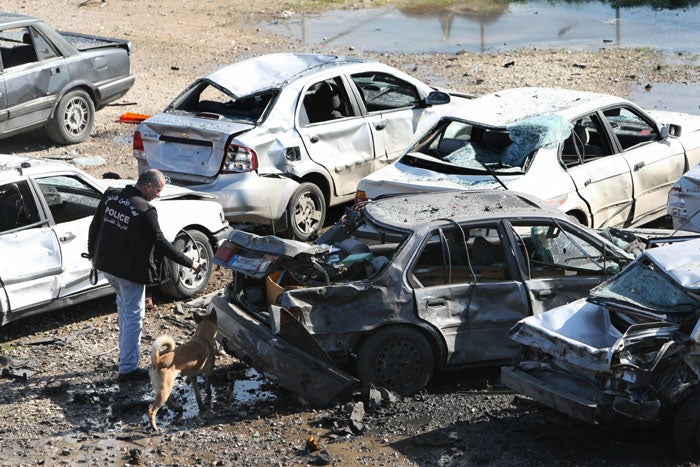Police captain killed in Beirut blast

A bomb exploded near an overpass in mainly Christian east Beirut today, killing a senior police officer and at least four other people, security sources said.
Police identifed the officer as Wisam Eid, a captain in a Lebanese police intelligence unit which is widely viewed as close to anti-Syrian ruling coalition leader Saad al-Hariri.
Firemen sprayed water over blazing cars and debris scattered over a road in the suburb of Hazmiyeh. A charred corpse was visible in one car. Body parts were strewn on the road.
The explosion occurred 10 days after a car bomb damaged a U.S. diplomatic car in the Lebanese capital, killing three people and wounding 16. No Americans were among the dead.
Last month a car bomb killed the army's chief of operations, Brigadier-General Francois Haj, in east Beirut.
Eid took up his post after his predecessor Samir Shehadeh was wounded in a roadside bomb south of Beirut in 2006.
The police intelligence unit has been closely involved in the U.N.-led investigation into the 2005 assassination of Hariri's father, former Lebanese Prime Minister Rafik al-Hariri.
The majority coalition accuses Syria of being behind that blast and many of the 30 or more bombings that have hit Lebanon in the last three years, many targeting anti-Syrian politicians and journalists. Damascus denies any involvement in the attacks.
Bombers have also targeted U.N. peacekeepers in the south, while a revolt by al Qaeda-inspired Islamist militants in the north last year further undermined Lebanon's stability.
Apart from its security problems, Lebanon is in the thick of a long-running political conflict pitting the Western-backed ruling coalition against the Hezbollah-led opposition.
The dispute has paralysed government for more than a year and blocked election of a new president, leaving Lebanon with no head of state for the first time since its 1975-90 civil war.
Rival factions have agreed that army commander Michel Suleiman should be the next president, but remain at odds over how to share power in a future national unity government.
Mediation by Arab League Secretary-General Amr Moussa has failed to bridge the gulf. He is due to report on his efforts to Arab foreign ministers meeting in Cairo on Sunday.
Join our commenting forum
Join thought-provoking conversations, follow other Independent readers and see their replies
Comments
Bookmark popover
Removed from bookmarks